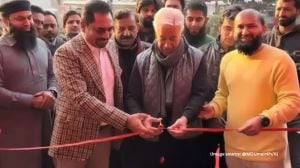Payback parable
Every time the station master at the Thane railway station announces for a 8220;stretcher hamaal8221;, Balu Kishan Dokre is on his toes.

His job is to ferry railway accident victims from Thane railway station, which was his home for seven years
Every time the station master at the Thane railway station announces for a 8220;stretcher hamaal8221;, Balu Kishan Dokre is on his toes. He knows he has to be quick, for every second counts when it comes to people injured in railway accidents. His job: To ferry such accident victims, dead or injured, to the Thane Civil hospital. This 33-year-old ambulance driver has been following the same routine for the last 13 years 8211; driving decapitated or badly mangled bodies found on the railway tracks as well as profusely bleeding but still-alive accident victims. What8217;s more, Dokre says he could have found a better paying job, but chose this one because he has an old debt to repay to the Thane railway station. Born in Arnala village along the Vasai coast, Dokre came to Thane 26 years ago, hardly seven years old then. 8220;At that time, I was staying with my father in the slums along the tracks at Thane station. But after he died, I started living in the station.8221; The slums were later demolished, to make way for Thane8217;s Platform Numbers 9 and 10. Dokre spent nearly seven years in Thane station, without any other place to call home. He did small jobs like rag-picking, shoe polishing and managing the parking of vehicles. Through this period, passengers and kindly officials at Thane station provided him with food, shelter and livelihood. The station also gave him his best buddies. 8220;I used to have food at the station sometimes from the canteen and sometimes someone would treat me. I used to take the Kasara local daily, to go to Khadavli where I could bathe in the river, before returning to the station.8221; His bed was the small area below the stairs of the foot overbridge. Later, Praveen Khanna, a shop owner at Thane, offered him a job at his shop inside Thane station. 8220;Khanna seth , who died two years ago, owned an ambulance, so he hired me as a helper. As I was accustomed to see people dying daily, I took up the job. Later, I also learned to drive.8221; Most significantly, he just wanted to help people at the station that gave him a home, he says. That8217;s why, when a stretcher hamaal is unavailable, Dokre picks up the dead or injured himself. Barely 17 when he got married, he now has four kids and owns a small house in Mumbra, with plans to buy a bigger place soon. Dokre has been witness to abuse, hate, hunger and young children taking up drugs and theft. Whenever he sees kids living at Thane station, he makes it a point to stop and chat with them. 8220;Because once you fall in, it is difficult to come out of it,8221; he says 8220;He not only saved my life but also guided me like my elder brother by keeping me away from bad habits,8221; says Ajay Kasbe 24 who, like Dokre, has lived in or around Thane station for many years. Kasbe, married with two kids now, polishes shoes at Thane station. Dokre does not keep count of people he ferries. 8220;But every time I ferry an accident victim who then survives, I think my job is done. People brag about properties they own, but I proudly say that I own Thane station -it is my mother and my father.8221;
- 013 hours ago
- 0214 hours ago
- 0316 hours ago
- 0416 hours ago
- 0516 hours ago































